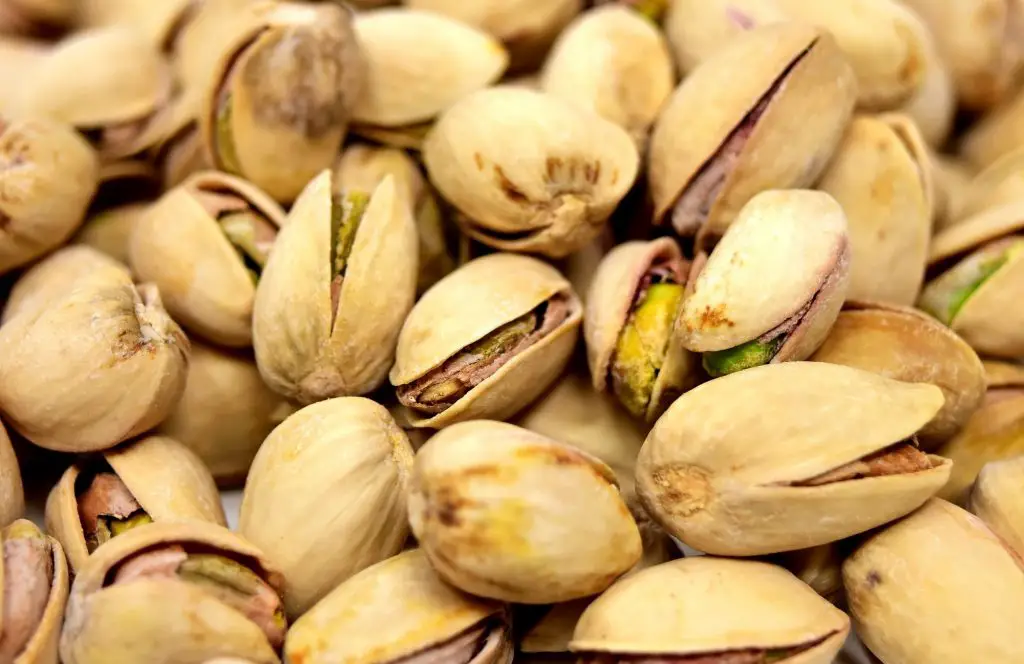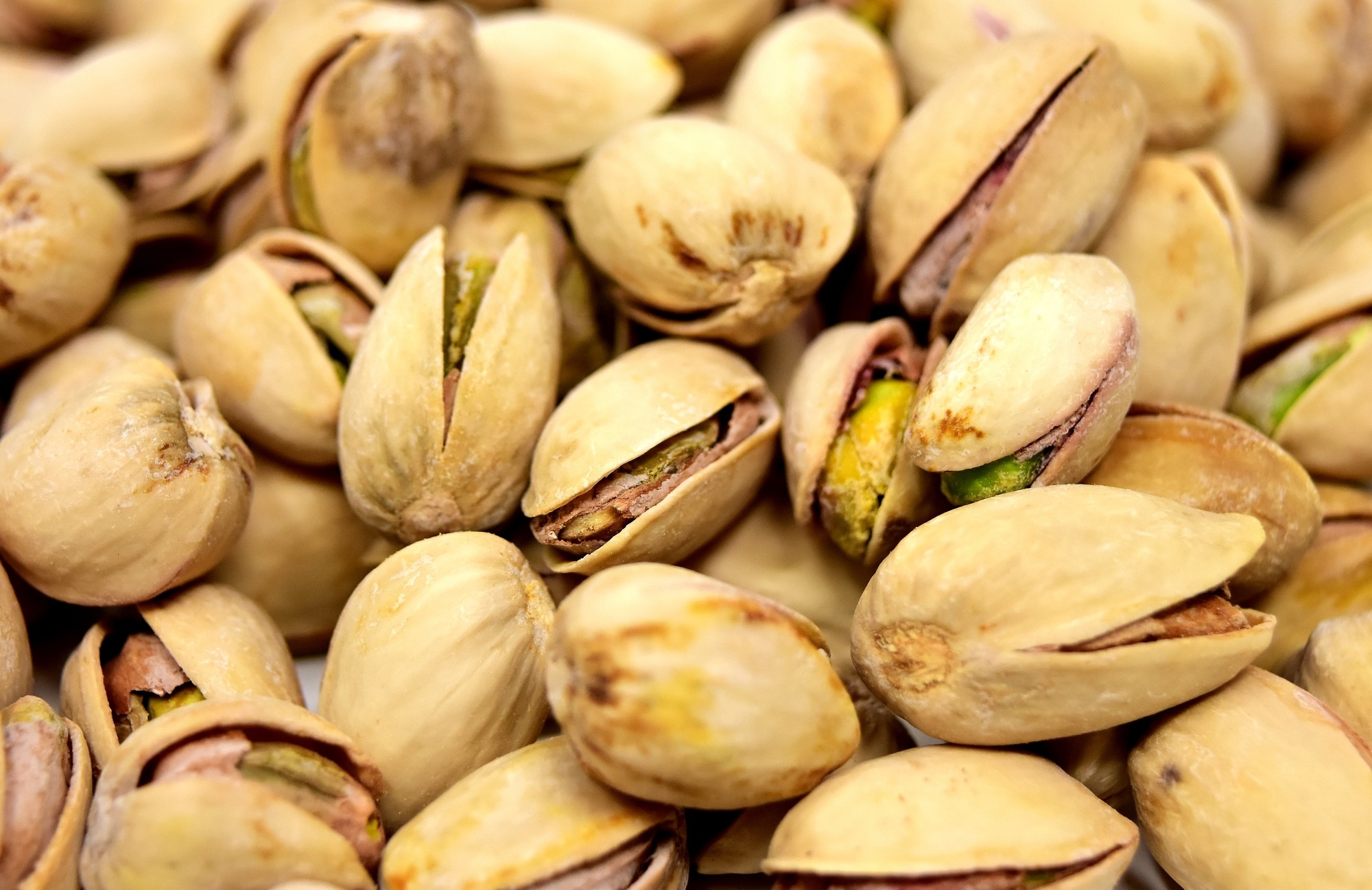Has your pup been stealing snacks off the countertop again? If your good boy or girl recently got into your pistachio stash, you may be wondering: can dogs eat pistachios?
The good news is that pistachios aren’t toxic to dogs. But these nuts also aren’t necessarily good for your furry friend either. Keep reading to learn why.

Contents
- 1 Can Dogs Eat Pistachios?
- 2 Are Pistachios Good for Dogs?
- 3 Risks of Feeding Your Dog Pistachios
- 4 What to Know About Pistachio Poisoning
- 5 How to Safely Feed Your Dog Pistachios
- 6 Are Any Nuts Toxic to Dogs?
- 7 Are Any Other Nuts Good for Dogs?
- 8 Healthy Snacks to Give Your Dog
- 9 More Advice for Keeping Your Dog Safe and Healthy
Can Dogs Eat Pistachios?
Pistachios are generally safe for your dog and other animals to eat. Most dogs can eat a pistachio or two without having an adverse reaction. It’s only when your dog eats large quantities of pistachios that problems can arise.
So, if your dog steals a few pistachios off the table, he should be fine. But most experts don’t recommend feeding your dog pistachio as a treat. Instead, choose a highly-nutritious treat formulated for dogs.
More on that later, but first, we’ll answer some frequently asked questions about dogs and pistachios.
Can Dogs Die From Eating Pistachios?
It’s very rare for dogs to die from eating pistachios. However, it can happen, especially if your dog consumes large quantities of pistachios.
Can Dogs Die From Eating Pistachio Shells?
Yes, dogs can die from eating pistachio shells. However, the shells themselves aren’t poisonous to dogs.
However, pistachio shells are tough and could lodge in your dog’s throat, blocking his airway. For this reason, you should especially keep pistachio shells away from small dogs.
Can Dogs Eat Pistachio Ice Cream?
Dogs should not eat pistachio ice cream. This isn’t necessarily because it contains pistachios but because ice cream isn’t healthy for dogs.
Dogs are commonly allergic to dairy products, so most experts don’t recommend feeding dogs ice cream. However, if your dog tolerates it, you can give him minimal amounts of pistachio ice cream.
How Many Pistachios Can a Dog Eat?
A pistachio or two is perfectly safe for your pup to eat. But don’t get into the habit of feeding your dog pistachios. Many treats are much healthier (and tastier) and are specifically formulated for him.
What Are the Symptoms of Eating Too Many Pistachios?
The biggest risk of a dog eating too many pistachios is pancreatitis. Pancreatitis is an inflammatory reaction that can happen if a dog ingests too much fat or calories in one sitting.
The symptoms of pancreatitis are:
- Heart arrhythmia
- Diarrhea
- Lethargy
- Fever
- Dehydration
- Vomiting
- Appetite loss
- Breathing difficulties
- Unexplained weight loss
- Abdominal pain
- Swollen abdomen
If your dog ate a large number of pistachios and he’s presenting one or more of these symptoms, call your vet ASAP.
What About Salted Pistachios?
High quantities of salt are not suitable for dogs. You should avoid feeding your dog pistachios regularly if they’re salted. But you only need to worry about your dog eating salted pistachios if he consumes a large quantity, as this can lead to salt poisoning.
We’ll talk more about salt poisoning below. But first, let’s discuss the benefits of unsalted pistachios for your pup.
Are Pistachios Good for Dogs?
When eaten in moderation, pistachios can be part of a healthy dog’s diet. Here are some benefits your pup can get from eating a small number of pistachios now and then.
High in Protein
One serving size of pistachios is an ounce. That also equates to about a handful of these delicious tree nuts. Pistachios contain complete proteins and a high amount of them with about 6 grams of protein per serving.
Protein is among the most important macronutrients for your pup. Protein helps dogs build muscle, which can, in turn, support bone health.
Contains Antioxidants
Antioxidants are compounds that are great for brain health and anti-aging mechanisms.
In dogs, particularly, research has shown that antioxidants can help prevent inflammatory diseases and even cancer. Pistachios are high in these healthy compounds, including:
- Carotene
- γ-tocopherol
- Selenium
- Flavonoids and proanthocyanidins
Antioxidants can also promote eye health in dogs.
Packed With Healthy Fats
Pistachios are a great way to get in your healthy fats. Healthy fats include monounsaturated and polyunsaturated fats, and these macronutrients can support heart health in humans and dogs.
Pistachios contain unsaturated fats, too. However, compared to many foods, pistachios are relatively low in cholesterol. They have only 1.5 grams of saturated and 0 grams of trans fats per serving.
Good Source of Vitamins
Pistachios also contain other vitamins, and minerals dogs can’t live without. These micronutrients include:
- Vitamin B6: A vitamin that supports brain function, heart health, and development in dogs
- Vitamin K: This vitamin helps your dog’s blood clot, which can prevent blood loss if he’s injured
- Thiamine: A mineral that’s important for growth and a healthy brain
- Manganese: This mineral helps dogs digest carbs and proteins better
Additionally, pistachios contain iron, magnesium, manganese, calcium, and copper.
Rich in Potassium
Potassium is an essential nutrient for dogs and humans. It helps support cellular function and bone health. Potassium also helps with communication in the heart, nervous system, and muscles.
Pistachios are an excellent source of potassium. All nuts have potassium, but pistachios have the highest amount of this nutrient per serving. One handful of pistachios contains 290 milligrams of potassium.
Full of Fiber
Fiber is an essential part of any dog’s diet. It helps with digestion and firms up your pup’s poop. Fiber also helps regulate your dog’s appetite because it makes people and animals feel fuller for longer.
Like many nuts, pistachios are great sources of fiber. One one-ounce serving of pistachios contains eight grams of carbs, three of which are from fiber.
Risks of Feeding Your Dog Pistachios
The benefits of pistachios for dogs don’t come without some downsides. Below, we’re detailing the top risks of feeding pistachios to dogs. Keep reading for everything you need to know.
They Have Too Much Fat
Remember how we mentioned that pistachios are high in healthy fats? There are 13 grams of fat in a one-ounce serving of pistachios. Most of this (11.5 grams) comes from unsaturated fats, which are good for dogs.
This high-fat content is one of the reasons why pistachios are so delicious. It’s one of the reasons why giving your dog a few pistachios here and there can be a healthy addition to his diet. But the fat in pistachios is also one of the reasons why these unsuspecting nuts can be harmful to your dog.
Too much dietary fat can cause health problems in dogs. Of course, the most obvious health complication of too much fat is obesity.
Up to 45% of dogs are obese. Obese dogs are at a higher risk of heart problems, bone issues, and even a shorter life span. In fact, obese dogs can live up to two years less than dogs that aren’t obese.
Further, too much dietary fat can cause pancreatitis in dogs. This condition occurs when the pancreas swells up. The most common symptom of pancreatitis is excessive vomiting.
Treatments for pancreatitis include liquid food treatments and special diets. Supplements are also beneficial for alleviating pain due to this condition.
They’re High in Salt
As we’ve mentioned, the high salt content in some pistachio snacks isn’t good for dogs. Signs of too much salt in dogs include muscle tremors, thirst, exhaustion, diarrhea, and vomiting.
Your dog can be especially at risk for salt poisoning if he has a heart condition. This is because too much salt can lead your dog’s body to conserve fluids. When your pup’s bladder conserves fluid from his urine, this can cause kidney damage, ultimately affecting the cardiovascular system.
They Contain Phosphorous
Phosphorous is a nutrient found in many healthy foods. In dogs, it can help maintain tooth and bone health. It’s also associated with maintaining a healthy metabolism.
Pistachios contain a high amount of phosphorous at 133 milligrams per serving. This amount is about 10% of the recommended daily phosphorous intake for humans.
Dogs have an even lower amount of recommended daily phosphorous intake. Depending on your dog’s weight, he should receive around 22.25 milligrams per kilogram of body weight daily. A large dog should receive more phosphorous, and a small dog should receive less.
But what happens if your dog has too much phosphorous? Excessive phosphorous can increase your furry friend’s risk of developing bladder stones. So, ensure you feed your dog phosphorous-containing foods in moderation.
The Shells Present a Choking Hazard
Pistachios aren’t edible. In fact, they’re so tough that humans can crack a tooth on them. While your dog may have stronger teeth than you do, these hard shells can still impact your dog’s ability to enjoy the treat.
In the worst-case scenario, these shells can also present a choking hazard, especially for small dogs. This is especially true if your dog is prone to inhaling instead of chewing his food.
Even if your dog does manage to crack a pistachio shell, the fragments can cause intestinal obstruction. Worse, the shell’s fragments can be sharp. These sharp pieces could potentially puncture your dog’s internal organs.
They Can Contain Other Harmful Compounds
Pistachios can also contain urushiol and aflatoxins, both of which are bad for dogs.
Urushiol is a chemical that you may recognize if you’re allergic to poison ivy. That’s because pistachios and the poisonous plant share this chemical in common. Dogs who are allergic to urushiol should not be fed pistachios because they may develop allergy symptoms.
Aflatoxins are mycotoxins. That means molds produce them. When a certain type of mold grows on pistachios, the fungus can produce aflatoxins and cause a condition known as pistachio poisoning, which we’re talking about next.
What to Know About Pistachio Poisoning
Pistachios can be poisonous to dogs. It’s very rare, but pistachio poisoning can happen if your dog eats large quantities of pistachios that were misprocessed.
Misprocessing can lead to the development of a mold called Aspergillus. And Aspergillus mold produces a poisonous compound called aflatoxin.
Pistachio poisoning can also occur if your dog eats too many old pistachios that weren’t stored correctly.
Aflatoxins can be present in many crops. Corn, peanuts, tree nuts, and cotton seeds are all known to develop aflatoxin-producing Aspergillus mold. Aflatoxins aren’t poisonous to humans, but they are to dogs.
However, some experts say aflatoxins are only poisonous to some dogs. Specifically, dogs with poor immunity may have a higher risk of pistachio poisoning.
Symptoms of Pistachio Poisoning in Dogs
Aflatoxin is known to cause cancer in dogs. It’s also hard for pups to digest, which can lead to the symptoms of pistachio poisoning. In dogs, these symptoms include:
- Yellow skin (AKA jaundice)
- Liver problems
- Fatigue
- Orange urine
- Vomiting
- Anorexia (i.e., appetite loss)
- Bruising or bleeding
If your dog has recently eaten some old pistachios or pistachios you suspect are moldy, you should call your vet. This is especially true if your dog is experiencing one or more of the above symptoms.
How Vets Diagnose Pistachio Poisoning in Dogs
As with any visit, your vet will first want to know your pet’s health history. Then, he or she will give your dog a physical exam with bloodwork.
If you suspect pistachio poisoning, your vet will then take stool, urine, and vomit samples. Vets can then examine these samples for the presence of aflatoxin. Your dog will receive his diagnosis based on these samples.
Treatments for Pistachio Poisoning in Dogs
Pistachio poisoning treatments vary depending on the severity of symptoms. If your pet’s symptoms are minor, your vet may prescribe an antibiotic and pain medication. For more moderate cases, your vet may also recommend stomach and liver-protecting drugs.
In more severe cases, your pet may require further treatment. Vitamin K and hepatoprotective medications can help in this case. Both of these drugs are beneficial for preventing liver damage.
Your dog may also experience dehydration as a side effect of pistachio poisoning. Ask your vet about IV therapy to help combat this side effect.
Recovering From Pistachio Poisoning
Pistachio poisoning due to aflatoxins typically isn’t lethal. Your pup will be alright with proper treatment and aftercare.
When your dog comes home from the vet, make sure to create a peaceful environment for him. Ensure your furry friend takes all of his prescribed medications.
Your vet will likely recommend a follow-up appointment. During this visit, your vet will make sure your dog’s liver is functioning properly.
Pistachio Poisoning Prevention for Dogs
There are a few things you can do to avoid pistachio poisoning in the first place. First, only feed your dog a small number of pistachios. We’ll talk more about how many pistachios you should feed your dog next.
Another thing you can do is buy your pistachios from a reputable supplier. If you’re unsure, look for signs of mold. Oddly colored nuts, dried-out meat, and bugs inside your pistachio bag could all be signs of pistachio mold.
Finally, always store your pistachios in an air-tight container if you don’t eat them in one sitting. Always discard any pistachios after four weeks after opening or if you notice any strange odors or color changes to the nuts.
How to Safely Feed Your Dog Pistachios
Do you love pistachios and wish you could share them with man’s best friend? You can absolutely feed your dog a few pistachios without any negative effects if you follow these tips.
First, choose dry-roasted and unsalted pistachios if you want to share them with your dog. This will reduce the amount of fat and salt intake your dog experiences from the snack.
Next, make sure to completely remove the shell before feeding your dog the pistachio. You could also try blitzing the pistachios in a blender before feeding them to your dog to reduce the risk of choking.
Finally, ensure you don’t overfeed your dog pistachios. Giving your pup a small number of pistachios will help support his healthy omnivore diet without experiencing the negative effects of too much salt or fat.
How Many Pistachios Should You Feed Fido?
The number of pistachios your should feed your dog depends on a few factors. First, big dogs can tolerate more pistachios per day than small or mid-sized pups. The other factor is how much potassium and fat your dog is getting through his food already.
The recommended daily intake of potassium for dogs is around 20 milligrams. Remember that one handful of pistachios contains almost ten times that amount.
In dogs, the recommended daily intake of fats (both saturated and unsaturated) is between 14 and 28 grams of fat. The exact amount of fat your dog needs depends on his size. But remember that one serving of pistachios contains 13 grams of fat.
Your dog’s food will contain small amounts of potassium and higher amounts of fat. That means your pup should be getting close to the daily recommended amount of fat and potassium in a day anyway.
So, to avoid giving your dog too much potassium and fat, only feed Fido a fraction of a serving per day. Since one serving is about 49 pistachios, that means only a few nuts per day.
If you’re still unsure about how many pistachios to feed your dog per day, talk to your vet.
When Should Dogs Not Have Pistachios?
Unfortunately, some dogs should never have pistachios. This includes dogs with health problems and dogs prone to food aversions.
Dogs who struggle with pancreatitis or obesity should not be fed pistachios. The high-fat content in these nuts can exacerbate symptoms of pancreatitis. And it can also lead to further weight gain in obese dogs.
Some dogs are prone to food aversion if they eat too much “human” food. If that sounds like your furry friend, only feed him a few pistachios every once in a while.
Are Any Nuts Toxic to Dogs?
Pistachios aren’t toxic to your dog unless they grow Aspergillus mold. But are there any nuts that can hurt your pup? Experts agree that pet owners should never feed their dogs macadamia nuts, pecans, or black walnuts.
We’ll discuss why next.
Macadamia Nuts
Never feed your dog any amount of macadamia nuts. Macadamia nuts can cause negative symptoms in dogs, which include:
- Overheating
- Extreme fatigue or lethargy
- Vomiting
- Muscle tremors
- Joint issues
- Walking problems
If your dog is showing any of the above symptoms and your suspect he might have eaten macadamia nuts, call your vet immediately.
Pecans
Never feed pecans to your pup. These nuts contain a toxic compound called juglone. Juglone is known to cause gastrointestinal issues in dogs and other animals.
Black Walnuts
Like pecans, black walnuts contain the toxin juglone. As a reminder, this compound is toxic to dogs.
Are Any Other Nuts Good for Dogs?
Pistachios can be a healthy part of your dog’s diet when eaten in moderation. But they aren’t the only type of nut that your dog can snack on. Here’s a list of healthy nuts that you can safely share with your furry friend:
- Peanuts
- Brazil nuts
- Almonds
- Hazelnuts
Of course, every dog is different. If your dog has a negative reaction to any of these nuts, don’t give them to him anymore and talk to your vet about better snack options.
Healthy Snacks to Give Your Dog
Your dog should get the majority of his nutrients from high-quality dog food. However, vets do say that up to 10% of a pup’s daily calories can come from treats. And treats definitely include non-toxic, nutritious “human” food.
For example, vets typically support feeding dogs the following snacks:
- Pumpkin
- Green beans
- Carrots
- Broccoli
- Squash
- Cucumbers
As with pistachios, always feed your dog these treats in moderation. And remember that dogs, like humans, are all different.
So, if your pup has an adverse reaction to any of these “safe” foods, stop feeding it to him immediately. You can talk to your vet about choosing healthy treats that won’t be toxic to your furry friend.
More Advice for Keeping Your Dog Safe and Healthy
So, can dogs eat pistachios? Yes, you can feed your dog a small number of unsalted, shelled pistachios every day if you want. But avoid overfeeding as too many pistachios can cause problems like pancreatitis and, rarely, pistachio poisoning.
Love your pet? Then you’ve come to the right place because we do, too! Get more advice for keeping your pup healthy and safe from our dog blog!



